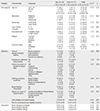Abstract
Purpose
This study was designed to evaluate the effects of an individual breast-feeding promotion program to address breast-feeding knowledge, attitude, method and rate of practice for married immigrant women.
Methods
A non-equivalent control group quasi-experimental design was used (experimental group=16, control group=17). The intervention consisted of 3 phases: (1) Within 2 hours of delivery - individual breast-feeding training through video/verbal/practical training education and demonstration (2) After 1~2 days - group training using video, model doll, and breast models (3) After 7 days - family visit, counseling, retraining and reinforcement training. The data were analyzed using non-parametric tests with the SPSS program.
Results
Married immigrant women who participated in the individual breast-feeding program scored high in knowledge, attitude, method and rate of practice compared to the control group.
Conclusion
The results indicate that the individual breast-feeding program is very effective in increasing breast-feeding knowledge, attitude, method and rate of practicing breast feeding for married immigrant women. So, nurses are encouraged to aggressively utilize individual breast-feeding programs to help married immigrant women, who are exposed to vulnerability due to various situations.
Notes
References
1. Kim DS. A conceptual scheme of international marriage of Koreans and analyses of the marriage and divorce registration data. Korea J Popul Stud. 2006; 29(1):25–56.
2. Statistics Korea. Multicultural population movement study [Internet]. Daejeon: Author;2015. cited 2015 November 19. Available from: http://kostat.go.kr/portal/korea/kor_nw/2/1/index.board?bmode=read&bSeq=201&aSeq=349827.
3. Kim HS. International marriage migrant women in Korea. Korean J Women Health Nurs. 2008; 14(4):248–256. DOI: 10.4069/kjwhn.2008.14.4.248.
4. Kim MY, Koh HJ. A study about intermarriage foreign wives' prenatal education needs, health belief and prenatal care compliance. Keimyung J Nurs Sci. 2008; 12(1):83–96.
5. Kim HR, Hwang NM, Jang IS, Yoon KJ, Kang BJ. International marriage migrant women's reproductive health conditions and priorities. Seoul: Korea Institute for Health and Affairs;2008.
6. Kim HR. Maternal health and nutritional status of marriage-based women immigrants in Korea and policy directions. Health Welf Policy Forum. 2009; 155:50–64.
7. Song ES, Choi YY. Preterm birth problem and prognosis in newborn baby born from international married foreign women. 2008 November 19; Hanyang University HIT. Seoul: The Korean Society of Maternal and Child Health;2008. p. 188.
8. Kim HJ. A study of spousal support, the demand for health education, and quality of life for married female immigrants. Korean J Women Health Nurs. 2008; 14(1):5–11.
9. Koo SM, Kim TI. The duration of exclusive breastfeeding practice and its related factors of married immigrant Vietnamese women. J Korea Acad Ind Coop Soc. 2012; 13(4):1672–1683. DOI: 10.5762/KAIS.2012.13.4.1672.
10. Jeong GH. Effect of the nursing intervention program on promoting the breast-feeding practice in primipara [dissertation]. Seoul: Ewha Womans University;1997.
11. Yu YR, Park SY. Effect of breast-feeding attitude and breastfeeding practice by individual breast-feeding promotion program. J Korea Acad Ind Coop Soc. 2013; 14(7):3310–3318. DOI: 10.5762/KAIS.2013.14.7.3310.
12. Choi YJ, Kim MO. Effect of a breastfeeding management program on breastfeeding duration. Korean J Women Health Nurs. 2007; 13(4):245–253.
13. Almroth S, Arts M, Quang ND, Hoa PT, Williams C. Exclusive breastfeeding in Vietnam: An attainable goal. Acta Paediatrica. 2008; 97(8):1066–1069. DOI: 10.1111/j.1651-2227.2008.00844.x.
14. Ergenekon-Ozelci P, Elmaci N, Ertem M, Saka G. Breastfeeding beliefs and practices among migrant mothers in slums of Diyarbakir, Turkey, 2001. Eur J Public Health. 2006; 16(2):143–148. DOI: 10.1093/eurpub/cki170.
15. Lee EJ. The effect of prenatal breastfeeding education on breastfeeding practice and retension of knowledge [master's thesis]. Daegu: Keimyung University;1997.
16. Cohen J. Statistical power analysis for the behavioral sciences. 2nd ed. Hillsdale, NJ: Lawrence Erlbaum Associates;1988.
17. Nunnally JC. Psychometric theory. 2nd ed. New York, NY: McGraw-Hill;1978.
18. Kim JK, Choi HM, Ryu EJ. Postnatal breast-feeding knowledge, techniques and rates of first-time mothers depending on a prenatal breast-feeding education method. J Korean Acad Soc Nurs Educ. 2011; 17(1):90–99. DOI: 10.5977/JKASNE.2011.17.1.090.
19. Helsing E. Infant feeding and infection illness. Copenhagen, DK: World Health Organization Regional Office for Europe;1985.
20. Riordan J, Wambach K. Breastfeeding and human lactation. 4th ed. Boston, MA: Jones and Bartlett Publishers, Inc.;2010.
21. Kim EH, Lee E, Kim MJ, Park DY, Lee SH. Effects of an educational program of pregnancy and delivery on pregnancy related knowledge, newborn care knowledge, and postpartum care selfefficacy of marriage immigrant women. J Korean Acad Nurs. 2010; 40(1):78–87. DOI: 10.4040/jkan.2010.40.1.78.
22. Kim MJ. A comparative study on birth outcomes between Korean women and immigrant women. Korean J Women Health Nurs. 2011; 17(4):407–414. DOI: 10.4069/kjwhn.2011.17.4.407.
23. Yun SE. Effect of the breast feeding knowledge, method and feeding
rate in primipara about the education of breast feeding according
to the stage of the prenatal and postnatal period [master's thesis]. Kongju: Kongju National University;2003.
24. Kim HR. Health status of marriage-based immigrants in Korea and policy direction. Health Welf Policy Forum. 2010; 165:46–57.
25. Yun SE, Lee HK. Effects of breast-feeding adaptation, attitude and practice of primipara depending on method of postpartum breast-feeding education. Korean J Women Health Nurs. 2012; 18(2):75–84. DOI: 10.4069/kjwhn.2012.18.2.75.
26. Lundberg PC, Ngoc Thu TT. Breast-feeding attitudes and practices among Vietnamese mothers in Ho Chi Minh City. Midwifery. 2012; 28(2):252–257. DOI: 10.1016/j.midw.2011.02.012.
27. Zhou Q, Younger KM, Kearney JM. An exploration of the knowledge and attitudes towards breastfeeding among a sample of Chinese mothers in Ireland. BMC Public Health. 2010; 10:722. DOI: 10.1186/1471-2458-10-722.
28. Jang GJ, Kim SH. The effect of postpartum breastfeeding support on the breastfeeding prevalence. J Korean Clin Nurs Res. 2010; 16(2):117–126.
29. Saunders SE, Carroll J. Post-partum breast feeding support: Impact on duration. J Am Diet Assoc. 1988; 88(2):213–215.
30. McLachlan HL, Forster DA. Initial breastfeeding attitudes and practices of women born in Turkey, Vietnam and Australia after giving birth in Australia. Int Breastfeed J. 2006; 1:7. DOI: 10.1186/1746-4358-1-7.




 PDF
PDF ePub
ePub Citation
Citation Print
Print






 XML Download
XML Download